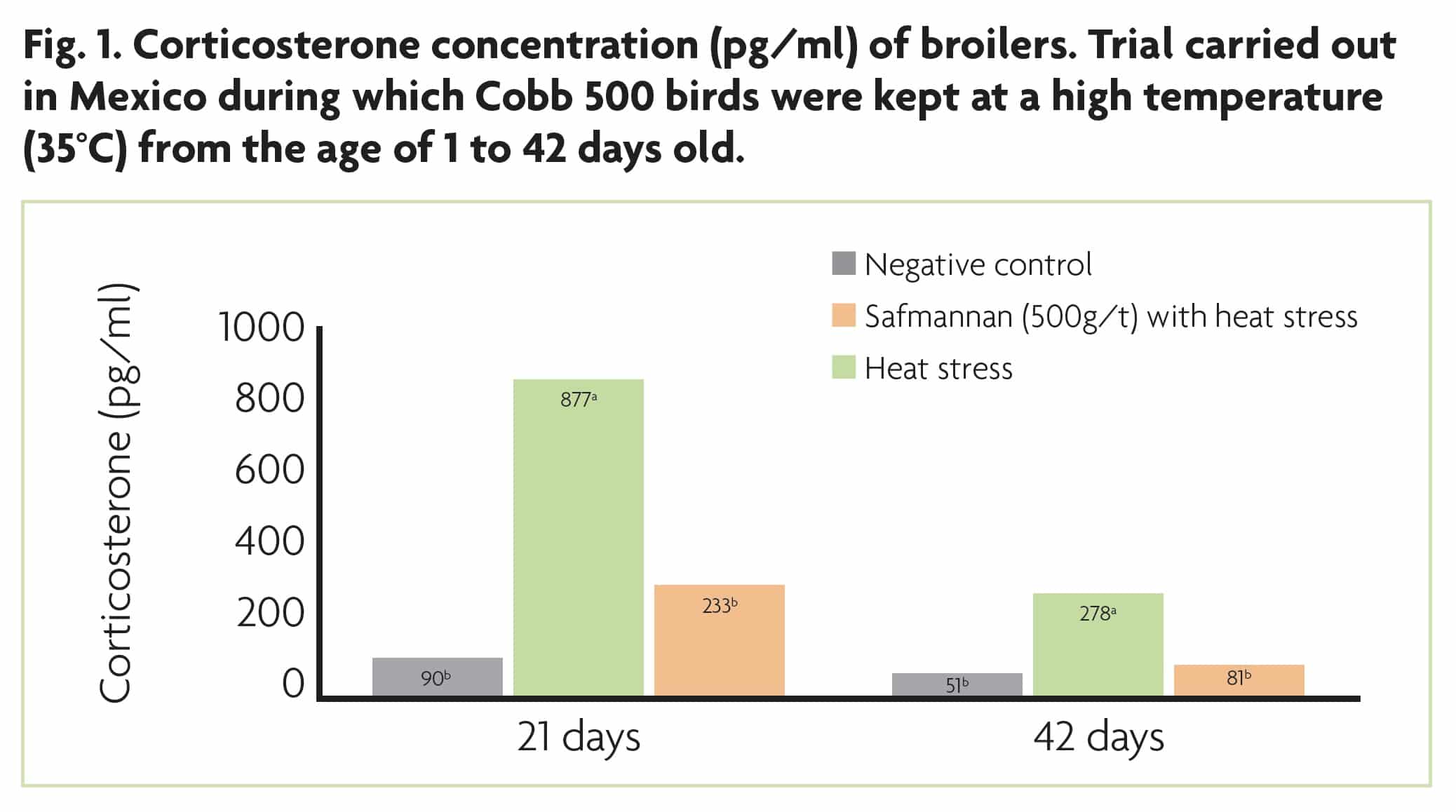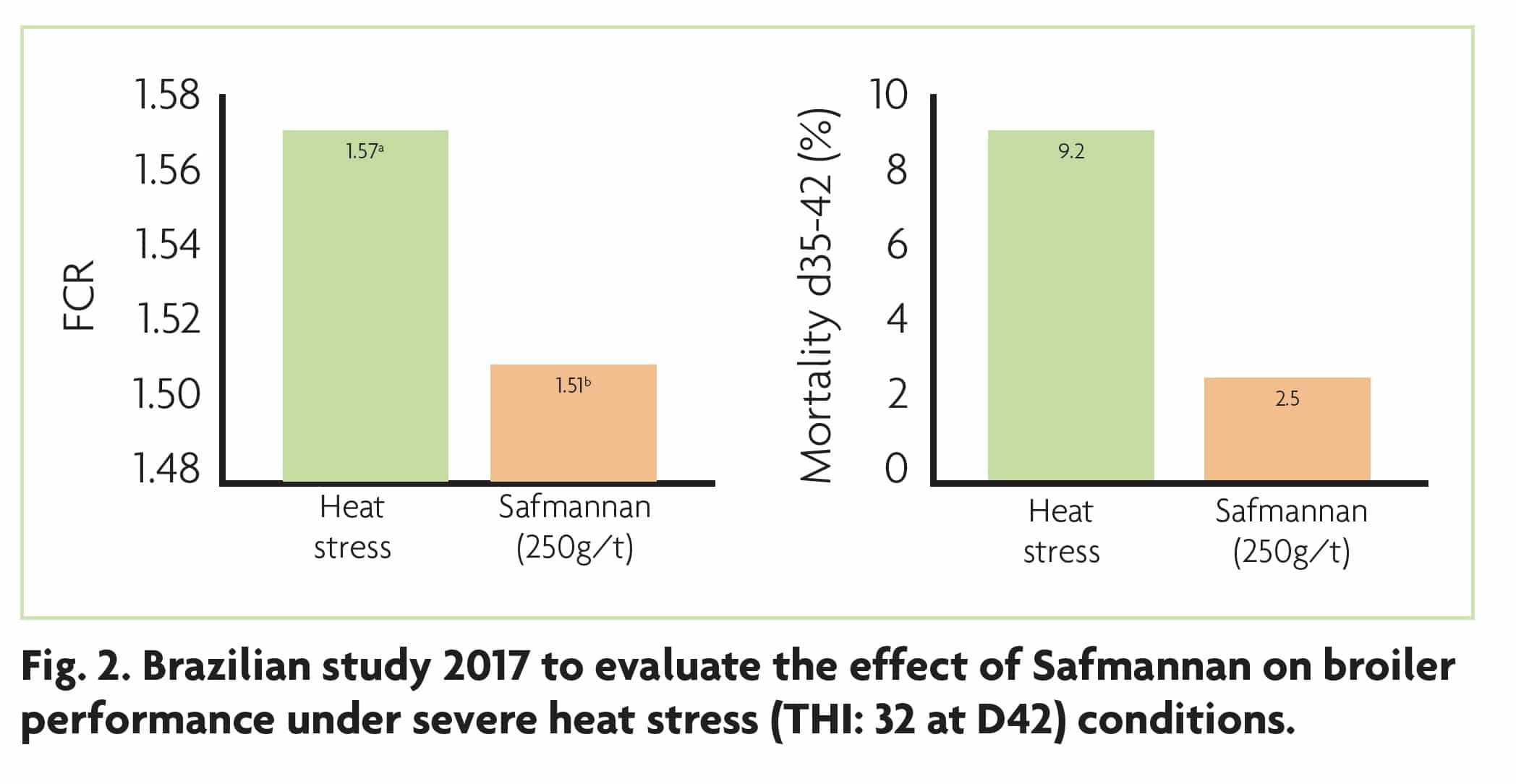21 Apr Maintaining the performance of broilers under heat stress
Broiler lineages currently used in the poultry industry result from a continuous selection for improved efficiency to convert feed into body mass and growth performance. However, one of the outcomes of such assisted evolution is less resistant individuals that are highly susceptible to heat stress, which occurs when broilers are unable to balance body heat production and body heat loss. As heat stress is a recurrent problem in the poultry industry that often results in continuous economic losses, it is critical to take preventive measures to address the negative zootechnical consequences of heat stress, while simultaneously improving animal health and welfare.
Physiological response to heat stress
Broilers under heat stress need to increase heat exchange between their body and the environment. This is achieved by diverting blood and nutrient flow from internal body organs, such as the liver, kidneys, and intestines, to peripheral tissues, such as skin. This process leads to hypoxia in the intestinal epithelium, which compromises intestinal integrity and facilitates the translocation of bacteria and bacterial products such as lipopolysaccharides into the internal environment, a process known as ‘leaky gut syndrome’. As a consequence, an immune response is triggered together with the activation of the neuroendocrine system and the concomitant secretion of adrenal corticosteroids to attenuate the immune response of the animal. In turn, corticosteroids will decrease the release of thyroid hormones (T3 and T4) responsible for controlling body temperature and metabolism, thereby increasing broiler’s susceptibility to heat stress and negatively affecting feed intake. Ultimately, the combination of heat stress, a weaker immune system, and lower feed intake increases the risk of inflammation, morbidity and mortality.
How to tackle heat stress?
Nutritional supplements are available to address heat stress in broilers. Particularly, feed supplementation with yeast cell wall compounds, such as, mannan-oligosaccharide and 1,3/1,6 β-glucan, has been shown to modulate immunity, preserve gut function and improve growth performance. This scientific knowledge is the foundation of Safmannan, a selected yeast fraction rich in mannan-oligosaccharides and β-glucans (1,3 and 1,6). High levels of serum corticosterone are an indicator of heat stress in broilers, as recorded in a scientific trial performed by Sohail et al. However, broilers grown under severe heat stress but given feed supplemented with Safmannan showed corticosteroids levels statistically similar to those under no heat stress, and also significantly lower than the heat-stressed group (Fig. 1). Feed supplementation with Safmannan contributed to normalise the serum corticosterone probably due to its ability to bind pathogens, thereby minimising inflammation and normalising hypothalamic-pituitary-adrenal axis function. The hormonal action of Safmannan extends beyond corticosterone. The levels of the hormones T3 and T4 usually drop under heat stress, thereby reducing feed intake and metabolic rate in order to decrease body temperature. This can be reversed by feed supplementation with Safmannan. Results from a scientific trial done in Mexico has shown that Safmannan stimulates the production of these thyroid hormones, which is a clear indication of reduced stress levels in feed supplemented broilers. The hormonal processes previously described have a direct effect on zootechnical performance of broilers. This can be prevented by using Safmannan feed supplement, as proven in a scientific trial carried out in Brazil that shows a reduction in FCR and mortality of broilers exposed to heat stress when the selected yeast fraction is used (Fig. 2). These results are likely driven by a reduced intestinal inflammation and by the overall gut health improvement.


An integrated heat stress management strategy
It is widely accepted that heat stress affects broiler performance and health. In particular, heat stress has detrimental impacts on gut integrity as it reduces the natural physiological capacity to address inflammatory processes caused by pathogens such as salmonella and E. coli. Safmannan is a premium sustainable nature-solution based on a selected yeast fraction that has been scientifically validated to improve the natural defences and the intestinal mucosal integrity. Moreover, Safmannan decreases the levels of the stress hormone corticosterone, and increases thyroid hormone concentrations, thereby contributing to normalise the hypothalamic-pituitary-adrenal axis function.
This feed supplement further contributes to mitigating the negative zootechnical consequences of heat stress, such as improving FCR, growth performance and survival. Safmannan is, therefore, a biological approach to address the physiological alterations induced by heat stress in broilers and improve their zootechnical performance, health and welfare.







Sorry, the comment form is closed at this time.